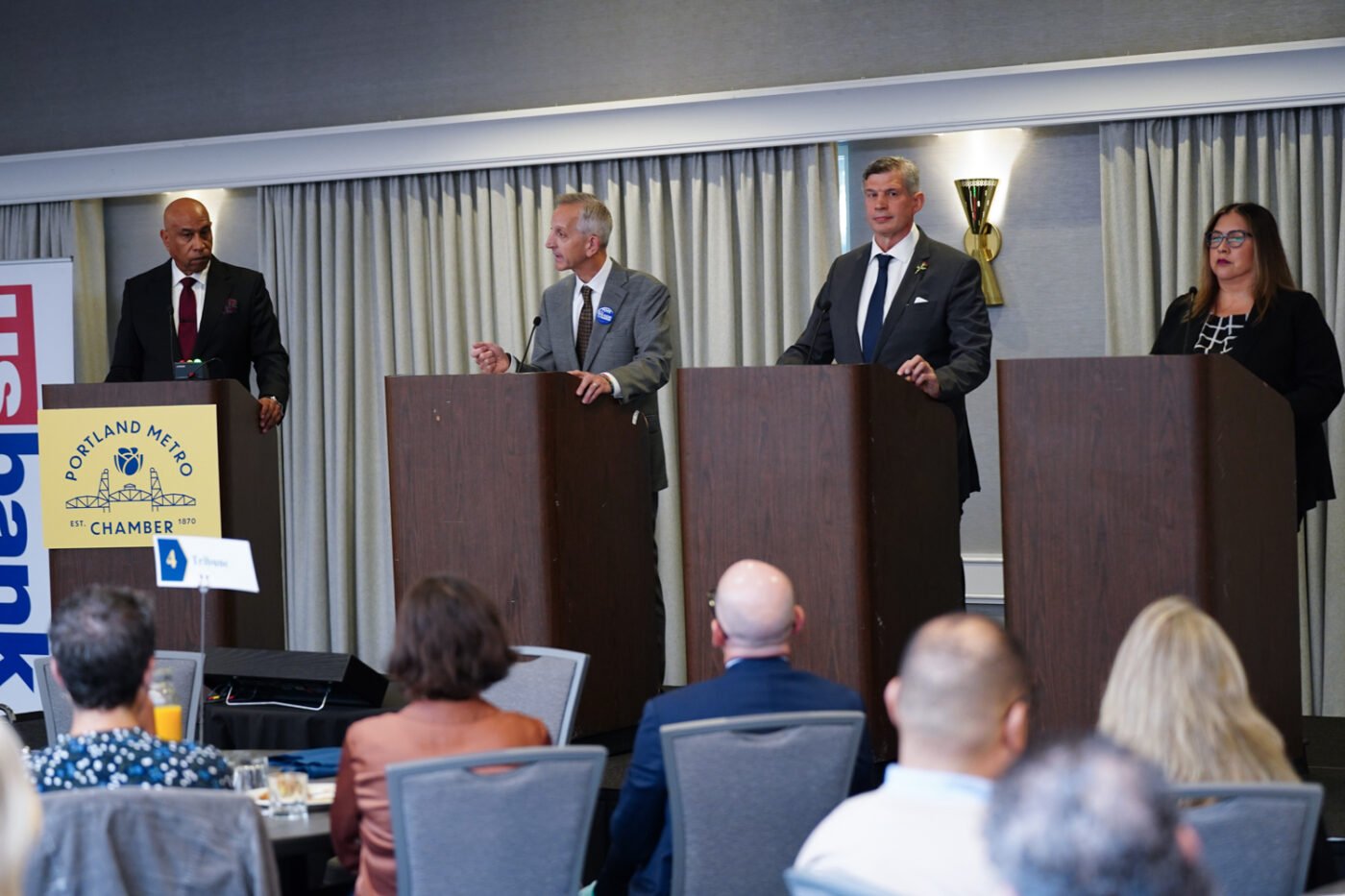
“We can’t accept more failures from the same city politicians that got us into this mess.”
– Keith Wilson
Three top contenders for the position of Portland Mayor took part in a debate this morning at the downtown Hilton. Corporate CEO Keith Wilson and city commissioners Rene Gonzalez and Carmen Rubio spent an hour sharing why they’re the right person to lead our city. The event was sponsored by the Portland Metro Chamber (formerly Portland Business Alliance) and moderated by Ken Boddie from KOIN News.
In addition to assessing how each candidate presented themselves and their ideas to this room of business insiders, I learned how each of them wants to position themselves as the contest enters its crucial final months. Their individual styles revealed notable contrasts: Gonzalez the fighter and confident front-runner; Wilson the calm and collected technocrat outsider; and Rubio the proven policymaker and coalition-builder.
I was there to gain a deeper understanding of the the race. I also hoped there’d be some discussion of transportation policy or road safety issues (in a recent survey, 89% of Portlanders said transportation is the most important service the city provides). But there was none. And unfortunately it wasn’t really a “debate” because the candidates were not given the chance to respond to each other. Boddie would ask a question and each candidate would give their two-minute response.
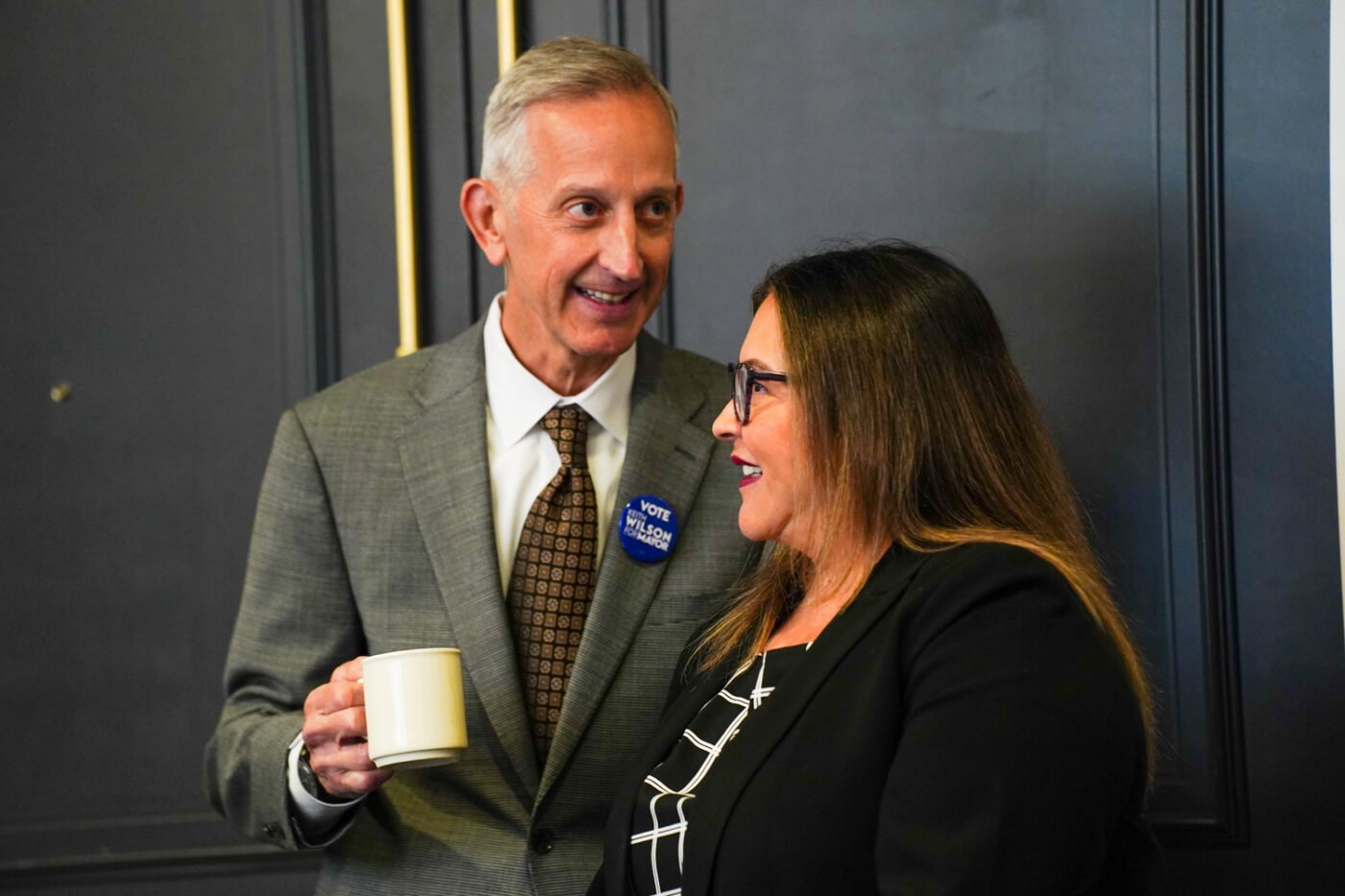
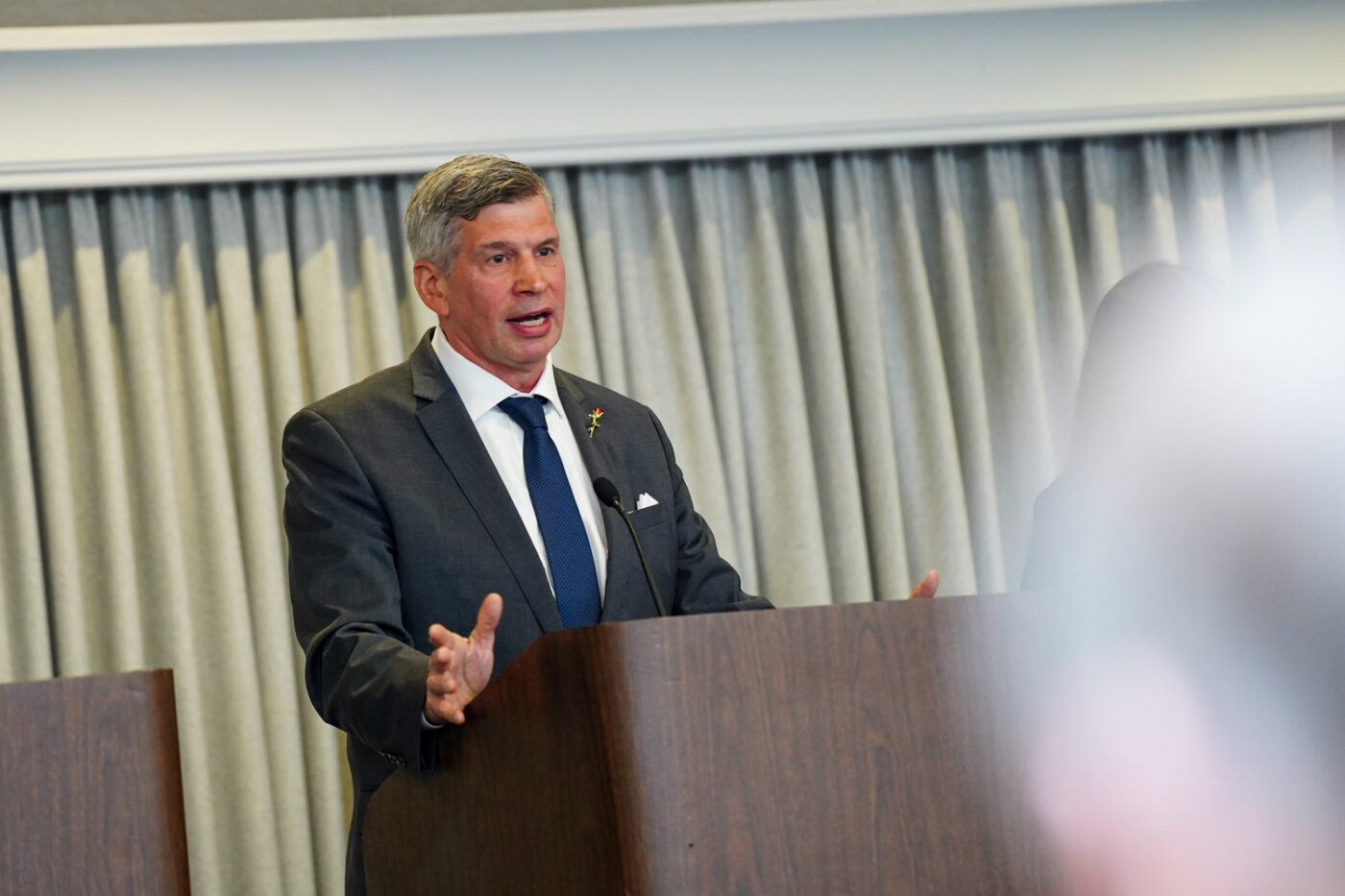
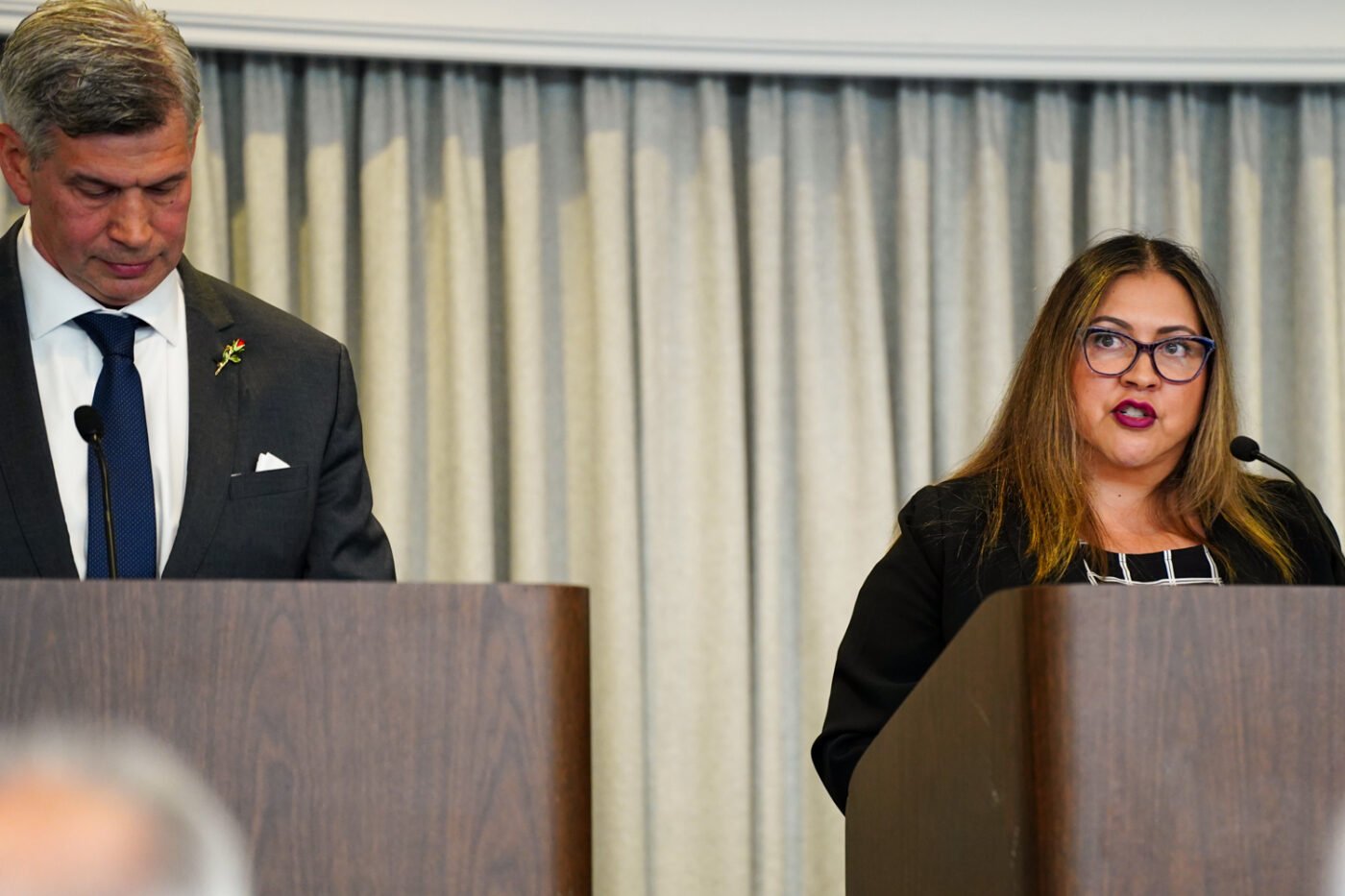
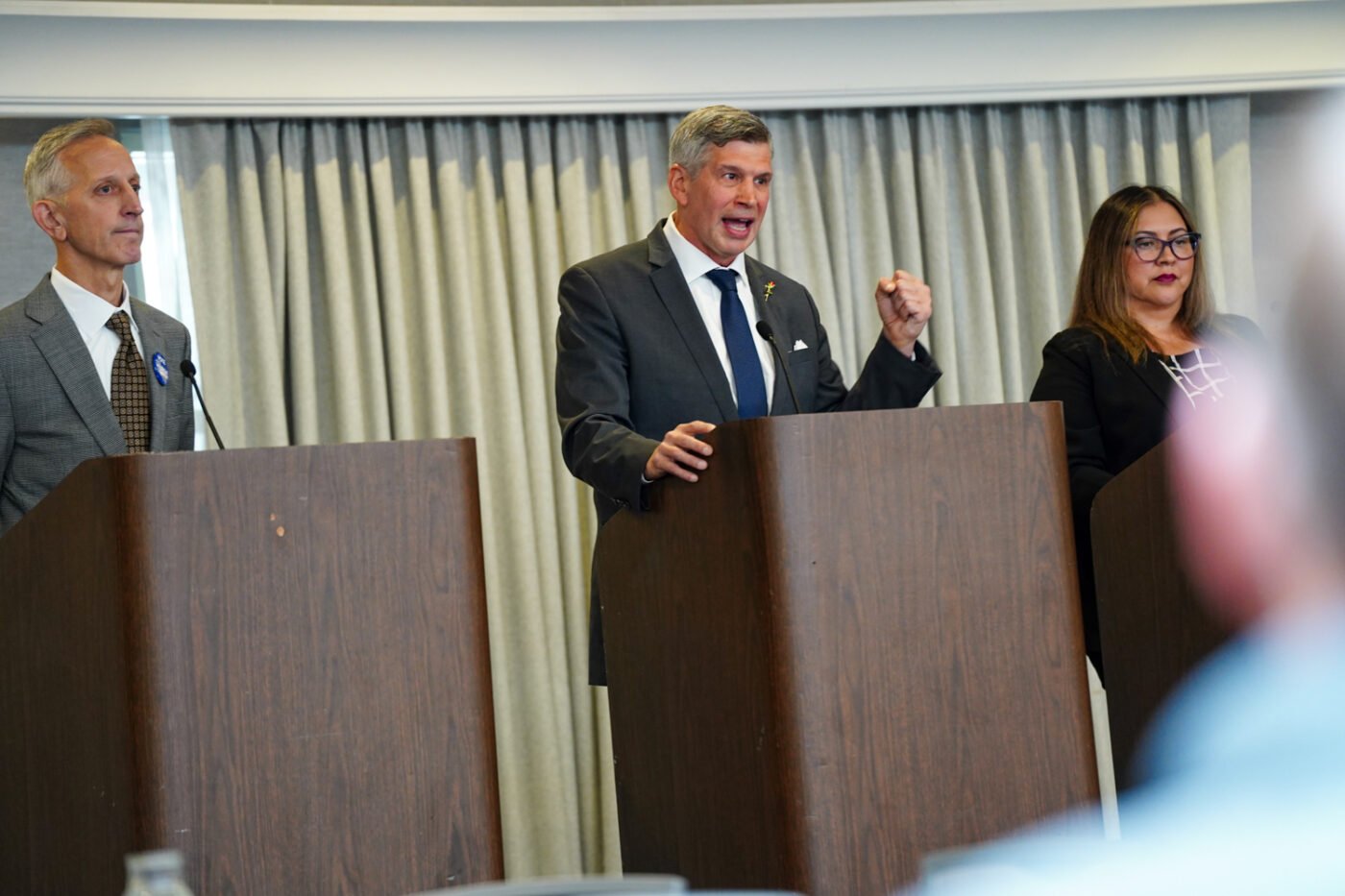
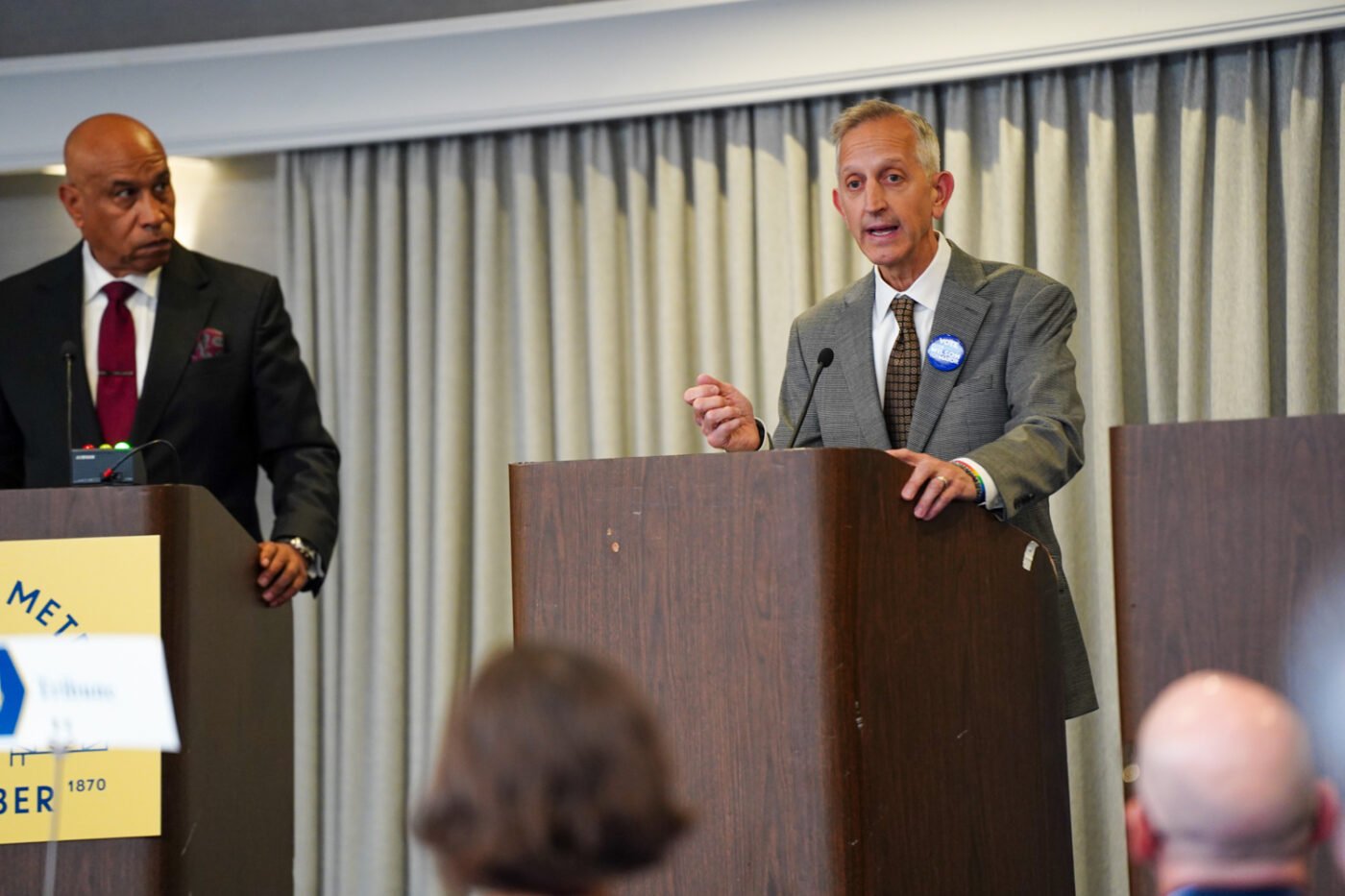
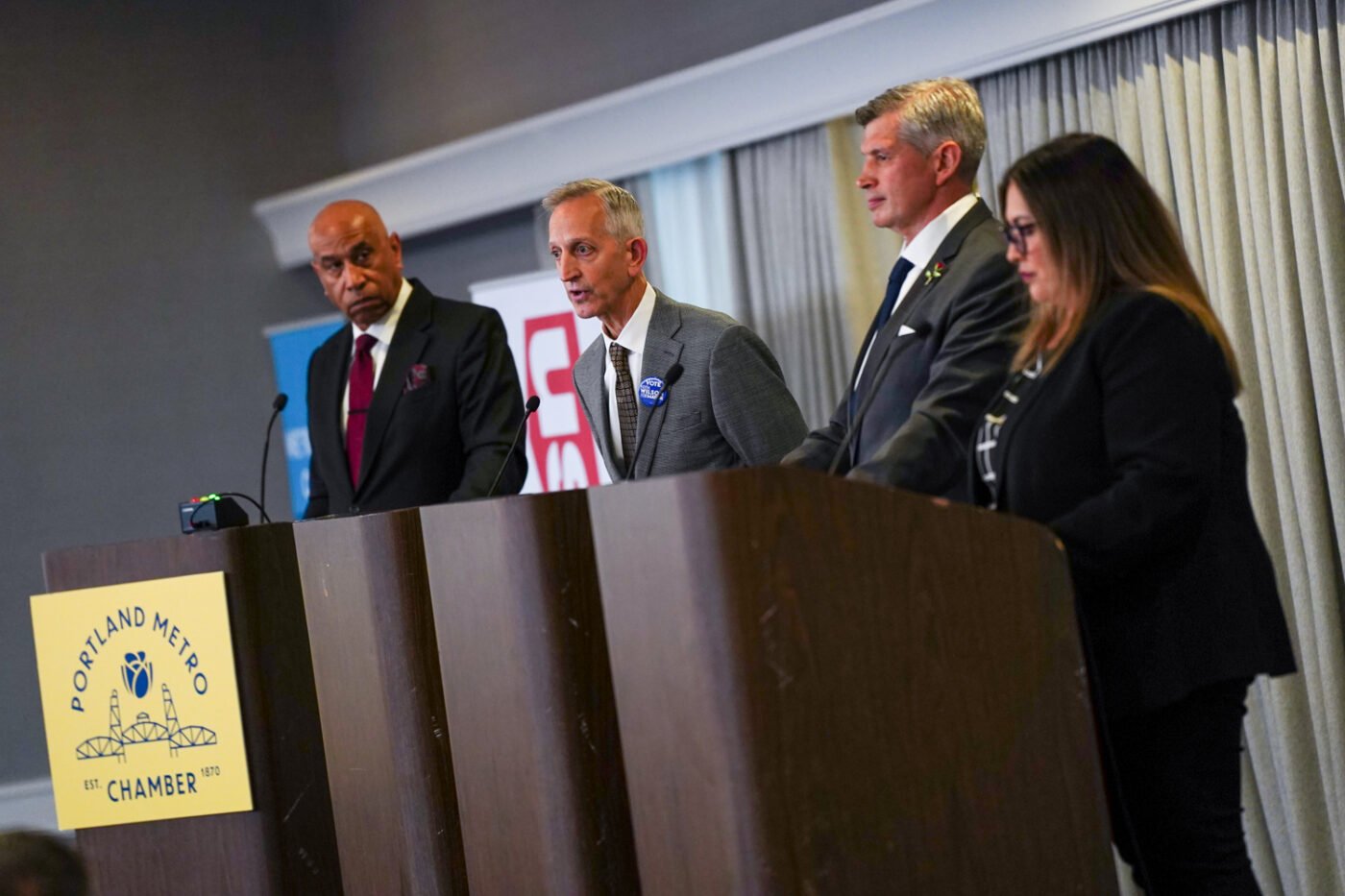
And no, Boddie didn’t ask anything about the reporting this week on Rubio and Gonzalez’s shocking history of traffic violations and other motor vehicle infractions. The questions he did ask were predictable: How would you lower the tax burden? What’s your plan to create more housing? Do we need more police? How would you revitalize downtown? And so on.
One thing to keep in mind as you consider mayoral candidates is that regardless of what you think about the position’s diluted power in the new form of government, who we elect will be consequential: This first mayor in the new system will set the mold. (“They will be creating the blueprint for subsequent mayors,” is how Rubio put it at the event.)
“As mayor, in my first 100 days, I’ll commit to taking more action to combat the epidemic of traffic fatalities, because we’re not talking enough about that.”
– Carmen Rubio
Wilson thinks he’s the best person to do that. And he’s latched onto an anti-incumbent narrative. “We can’t accept more failures from the same city politicians that got us into this mess,” he said in his opening statement. And while Gonzalez and Rubio touted their roles influencing policy as commissioners, Wilson feels like his leadership of a large company gives him an advantage: “I’m the candidate who has the executive experience that the new mayor’s role will require,” he said in his opening statement.
The other candidate with private sector experience is Gonzalez, who looked and sounded very comfortable on stage. He was definitely having the most fun (the last two words of his opening statement were, “Giddy up!”). Gonzalez wants people to think of him as the one candidate who will have an, “unwavering commitment to safety and livability.” On several occasions Gonzalez portrayed himself as the “standard bearer for safety” and someone who took difficult positions (like ending the free distribution of tents and tarps to homeless people, which he said led to “a horrible cycle of enablement”) despite vociferous pushback from some quarters.
“That took leadership, that took backbone, that took standing up to the loud voices that have so disrupted our community,” Gonzalez said. “Sometimes people are going to disagree. Sometimes they’re going to set your family member’s car on fire because they don’t agree with your position,” he said during his closing statement. “And you power through.”
In response to a question about policing levels, Gonzalez said, “I took down the face of the defund the police movement [a reference to former Commissioner Jo Ann Hardesty] in the last election. That was important in sending a message to our police officers that we’re going to stand with you.”
“Sometimes they’re going to set your family member’s car on fire because they don’t agree with your position. And you power through.”
– Rene Gonzalez
Unlike Gonzalez and Wilson, Rubio read almost all her responses from a script (even though candidates weren’t given answers ahead of time, the questions were so obvious it would have been easy to prep one-pagers for each topic). But what she lacked in oratory power, she made up for with direct digs at Gonzalez and a confident recounting of her productive record on Portland City Council.
“I’m the only candidate standing on the stage that has actually delivered your priorities with results… ask yourself: who of us up here has actually gotten things done for you?” Rubio said in her opening statement, trying to overcome the narrative that she’s not a business-friendly candidate. Asked for her signature accomplishment, Rubio pointed to her leadership on permit reform, where she, “Fought the entrenched culture and took on my colleagues — including Commissioner Mapps and Commissioner Gonzalez — and I was very tenacious and I got it done.”
Rubio repeatedly claimed that Gonzalez has been a “divisive” leader and that she is the better choice because her ability to build coalitions — even with people she disagrees with. “We need leaders with the temperament to work together, to sit at the table and get things done. There’s no more time for finger pointing or pontificating,” she said.
And while Gonzalez gave Rubio credit for passing various policies, he would add a “but” and say he feels council didn’t go far enough. “At a time of the complete collapse of private capital for housing in the City of Portland,” Gonzalez said, “we opted for incrementalism.”
At one point Rubio called him out on this: “Commissioner Gonzalez will say this [housing production policy] did not go far enough — but the truth is that he didn’t engage or contribute to this work when he had the chance, yet still voted for it.”
“We need more than just complaints and criticisms,” she continued, clearly referring to Gonzalez. “We need leaders who will act.”
On that note, Gonzalez said he wants to speed housing production by “peeling back the last 10-15 years of regulatory requirements on developers.” He floated an idea to credit developers for infrastructure investments, so they aren’t hit with a “double whammy” of paying for things like new sidewalks and system development charges (SDCs).
When the question turned to how candidates would reduce unsheltered homelessness, Wilson could talk up the nonprofit he founded (Shelter Portland) which works on that exact issue. “I have a facility I opened 20 weeks ago on 82nd Avenue. I’m connecting people with services that were previously unsheltered only a few weeks ago,” he shared.
This question gave Gonzalez and Rubio yet another opportunity to define their differences.
“What my colleagues up here are unwilling to talk about is the importance of enforcement,” Gonzalez said. “We have to set expectations for our sidewalks and parks and enforce it. That sidewalk is for children to walk to school, for your parents to be able to walk to the grocery store, for all of us to enjoy. It is not for someone to sleep and use hard drugs, and we have to be unrelenting in cleaning up our sidewalks in right of ways. There is no path out of the unsheltered problem without enforcement.”
Rubio spoke directly to Gonzalez in her response, saying she agrees on the need for safe and clean streets but that, “Some of my colleagues want Portlanders to believe we have to choose between, I think you called it, ‘enablement’, and compassionate solutions — and I think that’s a false choice.” Rubio said her work to change city code to build shelters and housing more quickly could be scaled-up if she’s elected mayor.
When Boddie asked how the candidates would help downtown’s economic recovery, I hoped to hear something on the role of streets and/or public spaces. Nope. Their answers focused on giving more tax breaks to business owners, more policing of spaces to “restore livability”, and boosting the arts.
Asked if they’d support increasing the number of Portland Police Bureau officers, all three said “yes” — although Wilson qualified his answer by saying he’d focus on making existing officers more efficient by not having to arrest unhoused people so often. Gonzalez said not only would he like to see the PPB’s ranks swell to 1,200 officers (up from a current total of 908), he wants to bring back neighborhood watch programs. He called shutting down programs like that one of the “many stupid decisions made in the City of Portland for idealogical reasons.”
After Rubio said she’d support “right sizing” the PPB, she went a bit off-topic (was she trying to clean up this week’s bad PR?) and made the strongest (and really only) statement about transportation policy in the entire event:
“As mayor, in my first 100 days, I’ll commit to taking more action to combat the epidemic of traffic fatalities, because we’re not talking enough about that, and investing in safe streets. Because we should all have safe, clean streets for everyone.”
This is where I wish Boddie or another candidate could have responded. If Rubio cares so much about traffic safety, would she also commit to operating her car legally and taking responsibility for her actions while behind the wheel? That would have been an interesting exchange.
The only other comment about transportation came from Wilson. He shared a story about how, as CEO of Titan Freight, he had to make a big decision about a new safe driving program. When word came down to his drivers that they’d have to install data monitors to track speed and other safety metrics, 50 of them said they’d quit.
“I said, OK, we have the potential of losing 50 drivers or saving one life,” Wilson shared in one of his strongest moments of the event. “If our core value is truly safety, we have to lose the 50 drivers. So we implemented the system and not a single driver left.”
Wilson said that decision shows he leads with core values intact.
In his closing statement, Gonzalez also said he’ll lead with his values front-and-center. “When you elected me two years ago, I didn’t exactly hide who I was,” Gonzalez said. “I didn’t pretend I was something that I’m not. I was focused on families, on businesses, on a healthy, safe, beautiful city. It can be that again… We have to reposition our city, but we don’t deviate from those core values to drive our city forward.”
Rubio’s final words of the event focused on how she’d have the “guts to make tough choices.” “We don’t have to forget who we are in order to change things… We don’t need flashy, we don’t need any more drama or division. We just need accountable and competent leaders.”
And Wilson said if his competitors could do the job, they should have more to show for it by now. “Let’s face it, my opponents had years to build a coalition and deliver results, and haven’t… They’ve wasted hundreds of millions of dollars. As a result, we’ve lost families, jobs, small businesses, and worst of all, lives.”
“If you like the way the city’s being run, then I’m not your guy,” Wilson continued. “But if you want real change, then I ask for you to vote for me… The Portland Renaissance we all want is within our reach. Together, we will repair, restore and revitalize the city that we love.”
Watch the full debate via KOIN’s YouTube channel here.



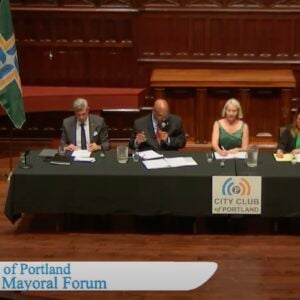
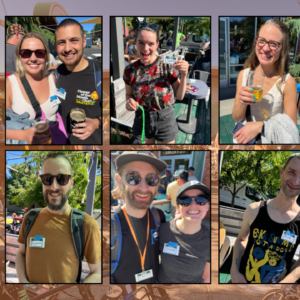


Thanks for reading.
BikePortland has served this community with independent community journalism since 2005. We rely on subscriptions from readers like you to survive. Your financial support is vital in keeping this valuable resource alive and well.
Please subscribe today to strengthen and expand our work.
Good write up.
Rene still makes sure people know he is a victim and Rubio wants accountable leaders which is hilarious for someone who refuses to pay traffic fines..
Wilson is by far the best choice for the city.
the more I hear from Wilson, the more I’m thinking he is indeed the best choice.
In early 2020, just shortly before the lockdown for the pandemic, BikeLoud held a rally at City Hall. It was an election year and many politicians showed up to curry favor with the crowd.
Kieth Wilson, running for commissioner at the time, mistakenly showed up a bit early, a schedule snafu on his part.
Instead of coming back later or just waiting around on his phone, he helped to setup for the event and in particular to frost cupcakes. I didn’t know much about his politics but the help was appreciated and it made me pay attention to Kieth Wilson.
Now I’ve heard something else that I really like.
I don’t mean to sound dismissive, but is frosting cupcakes what we really need to see in a mayor? The job is REALLY hard and very few people can do it well.
Wilson is getting a pass from you all b/c he has never had to deal with the rough-and-tumble of elected office. I don’t want him doing a trial in the most important elected office in Portland.
None of the incumbents have given me any faith that they’re among those very few, and they’ve had an opportunity to prove otherwise.
So it’s a gamble versus several sure losing bets. Rationally, the gamble is the better option.
The unasked question that the power brokers of Portland wished had been asked:
“How much taxpayer money are you going to funnel to the construction and non-profit industry if you are elected?”
This response doesn’t make any sense. It’s not a choice between enablement and compassion. It’s a choice between two visions:
Rubio’s vision will not sweep sidewalks to keep them clear for school children and disabled people. No amount of shelter building will clear the sidewalks, because we have a population that refuses to go into housing.
Wilson/Gonzalez vision: build shelters and sweep to clear our sidewalks.
This is the choice.
I’m with you here, Chris. The refusal to do the basics is the hallmark of pols like Rubio.
I’m sure I speak for many Portlanders in saying that we are tired of the pols that refuse to do anything to address the problems we’re all seeing.
My plan is to put Wilson at #1 and Rubio at #2. Rubio’s law breaking is very problematic, but Gonzalez would be so much worse as mayor that harm reduction is needed. I like how Mapps isn’t even an afterthought at this point.
Taking their answers at face value, they all said interesting stuff and it was well worth watching. I’d like to see them in another forum to see if they have the same stories.
Gonzalez brought up MLB twice even though it wasn’t in the questions. Maybe the stadium is meant to incorporate 40,000 housing units? He didn’t even offer a concept of how to pay for a stadium. Maybe a surcharge on the adjacent frog ferry stop.
He’s also crowing about defeating Hardesty and yes I know some are pleased.
If Rubio is mayor maybe somebody will be driving for her??
The homeless and transportation policy lead my list of concerns. My favored model for homeless encampments is local Mark Lakeman’s combination of tiny homes more like hostel rooms that bunk 4 to 6 alongside scattered tents. Gov Kotek policy forbids tent camping for no good reason I can fathom. Lakeman’s models includes necessary facilities and amenities – shade trees, raised gardens, seating and pathways instead of barren gravel and asphalt.
In transportation, I consider ODOT, PBOT, Metro and Tri-Met infernally corrupt. A federal investigation of these agency directors, department heads and project managers is warranted. When life threatening project proposals like the Rose Quarter I-5 so-called “improvement” and the SW Corridor MAX extension to Tigard are heralded as ideal, Houston, we have a problem.
Low income housing development inappropriately located near I-5 on/off ramps or facing 45+mph speeding traffic should be considered Reckless Endangerment. When predictable accidents lead to injury and fatalities, Negligent Homicide is a felony offense.
We get to rank six mayoral candidates. SMH.
René González (I agree that Portland has been enabling abuse of its public spaces and rights of way of for far too long. In four years it will be very easy to judge if he has succeeded or not. He is direct about his priorities and could be a welcome throwback to a more functional and pragmatic time in Portland politics.)
Keith Wilson (the whole trope of the businessman outsider who’ll shake up the system has never rung true to me, but he seems like a genuine guy with a realistic sensibility who would be an acceptable alternative to my first choice.)
Carmen Rubio (I don’t doubt she could do the job, but she is clearly the local progressive establishment choice. Of course she will be able to cooperate well with the likes of Tina Kotek and JVP and the likely slew of new progressive city councilors. They are cut from the same political cloth and epitomize the status quo in this town for good and bad.
Liv Østhus (if the election gets this far down the list, “why not” starts to seem semi-reasonable. I’m sure she has got some ideas that would go viral among conservative trolls on X. She is Portland personified, and you know, Viva Las Vegas.)
Mingus Mapps (Yes, below the “Stripper Artist Writer Musician Mom Muse.” A disappointment and ultimately feckless. He has managed to somehow encapsulate the things I like the least in both González and Rubio. Definitely going to be the last to sit when the music stops.)
Blank (I can’t name another one, but apparently there are fourteen more candidates that’ll appear on the ballot.)
I like your ranking, Adam. I personally am not planning on ranking any other candidates beyond my first choice since doing so will help them get elected.
If you don’t want Liv or Mingus, you shouldn’t list them at all – you don’t need to fill out the whole thing.
I hear ya. There is some fun in the novelty of getting to select up to six candidates. I wish my numeric outline formating that showed up in the comment box while I was typing had translated to the actual post here.
I’ll try to fix it with dashes. The software is clunky.
Why wasn’t Mingus there?
He’s been MIA this whole election
Too bad Mingus didn’t drop out of the mayoral race and run for City Council. He’s a lot better than most of the nut job candidates just looking for a part time job with a $133,000+ salary.
Mingus Mapps will be my first choice, probably followed by Wilson. I don’t want a mayor who hasn’t followed the laws herself. She needs to explain that before I’d vote for her.
Anyone but Rubio. We can’t go back to 2020
If it hadn’t been for recently revealed transgressions of Rubio it’s quite clear most of the Portland far left progressive crew (including the owner of this blog ) would have voted for Rubio. Now they’re jumping ship to Keith Wilson, the trucking company CEO. That’s amusing in itself but the other is his only true talking point is that he can end homelessness. Yet he has no governmental experience, MOST of the $ and responsibility for homelessness lies with Multnomah County and he has zero consequences for those who refuse shelter. Look carefully before you leap.
Why is it amusing?
It’s “amusing” because he has made several knee-jerk criticisms of Wilson that he thought should turn bike Portland commenters against Wilson, but nothing has stuck. Maybe another post about more cops and out of control crime will convince me.
Do you know or anyone else know what Wilson’s position is on expanding the I-5 bottleneck in Portland (adding lanes via the Rose Quarter expansion)? The Oregon Trucking Association strongly supports more lanes. Does Keith agree?
Being the CEO of a large trucking company my guess is yes he supports the Rose Quarter expansion, but I haven’t seen any discussion of this by Mr. Wilson. Have you?
https://www.ortrucking.org/ota-in-action/
The Rose Quarter segment of I-5 is NOT a bottleneck. That’s a lie. Traffic backs up much worse on the Fremont and Marquam Bridges and on I-84 in all directions. Truckers should understand why moving the southbound exit from Broadway to Wheeler Way is a horrific mistake. The existing southbound on-ramp can remain for trucks but for most traffic a new southbound on-ramp located at Weidler is the one improvement necessary to reduce street traffic hazards; yet appears to be off the table. ODOT is corrupt.
Seriously? You don’t see the irony of all the “cars/trucks are evil” crowd jumping on the ship of the CEO of a large trucking company (even if he is supposedly a bit more “enlightened”)?
This “crowd” sure sounds like a convenient strawman. Certainly a lot easier than concrete points with concrete individuals, eh?
I wouldn’t consider it ironic. Gonzalez is such a pathetic grifter that even bike lovers would vote for a trucking CEO before they would consider him. I would probably think of this as illustrative rather than ironic.
Trust me. You certainly don’t speak for all “bike lovers”. I’m one and Gonzalez is my choice.
I suppose if someone believes they can tell what “most of the Portland far left progressive crew” believes by reading some Bike Portland comments, PLUS believes that ALL those people are “cars/trucks are evil” believers, PLUS believe that they were ALL going to vote for Rubio, PLUS believe that they’re now ALL going to vote for Wilson, then I could see how that person might be amused.
“Truckers should understand why relocating the southbound exit from Broadway to Wheeler Way is a horrific criminal act.” A blind hairpin turn producing rear-end multi-car/truck collisions and rollovers trying to avoid collision by pulling left into the soft grassy lawn. And Winning Way becomes a truck route? Oh sure. Keith lost my vote for his loyalty to truckers.
Rubio’s self-described style of cooperation, consensus building and getting things done is a strength of hers, but is also one of my biggest concerns. Her capitulation on Zenith and readiness to toss out bike parking requirements suggest that she doesn’t have guiding principles that align with the things I value.
On the other hand, Gonzalez says his strength is that he’s willing to do things that are unpopular, but the things he wants to do are absolute garbage. The nickname “Red card Rene” truly sums up his failed tenure as a councilor. He appeals to the slice of the public that are angry and want to someone get hurt; much like a contentious soccer match where fans are frustrated and the opposing team starts to look barbarian invaders instead of a bunch of people who run around kicking a ball. He is more than happy to put his studs into the ankle of the easiest target and then beg for adulation or roll around on the ground like he was decapitated because a black woman brushed against his shoulder.
He literally trips people in his old guy futsal matches like his old guy futsal career is on the line. Tellingly, his only skill is destroying things. He messed up PSR. He is trying to sabotage police oversight. He has continuously miscalculated what he could get away with, and even his rich donors must be disappointed with the fact that he only has achieved getting his hand slapped several times. He can’t shoot, he can’t dribble, he is just flailing around getting penalized week after week. Thank god he isn’t coaching soccer anymore. I wish someone would just go ahead and give him the secret password to the super special men’s club that his malignant narcissism craves. He could go ahead and spend the rest of his days smoking cigars, sipping overpriced bourbon and making fun of liberals and poors without having to prove how cruel he can be.
I realize that Wilson in many ways is an unknown quantity and hasn’t been stained by the struggle of trying to make progress from within a city bureaucracy. My hope is that he wouldn’t be a sycophant the way that Rubio has been to sustain her political career, or the way that Gonzalez has been to get a pat on the back from Jordan Schnitzer and redeem his many sad failures.
I still don’t know who I will vote for, but I am more encouraged by the urbanists running for council. The part that bothers me most about Rubio’s tickets or the lack of appreciating the importance of bikes, is that it reveals a lack of vision of how cities work and the role that they play in sustainability. We need someone that understands how city government works, but more importantly, we need someone who understands how cities work and can evolve.
After last week’s reporting, I felt like the City deserved a stronger field of candidates. However, if this debate is any indication, there are at least three candidates who would be way better than half of the US Presidential candidates!
Seriously though, while Rene says all the right words, his record is such a shitshow- disrupting the deliberations of the Council with last minute bullshit, playing the victim. I feel like he’s playing a part, rather than getting down into the nitty gritty of effective leadership.
And I would have argued in favor of Rubio but… she’s disqualified at this point.
I live in Milwaukie, so I don’t get a vote in this election, or I’d be seriously looking into Wilson. I like his vibe!